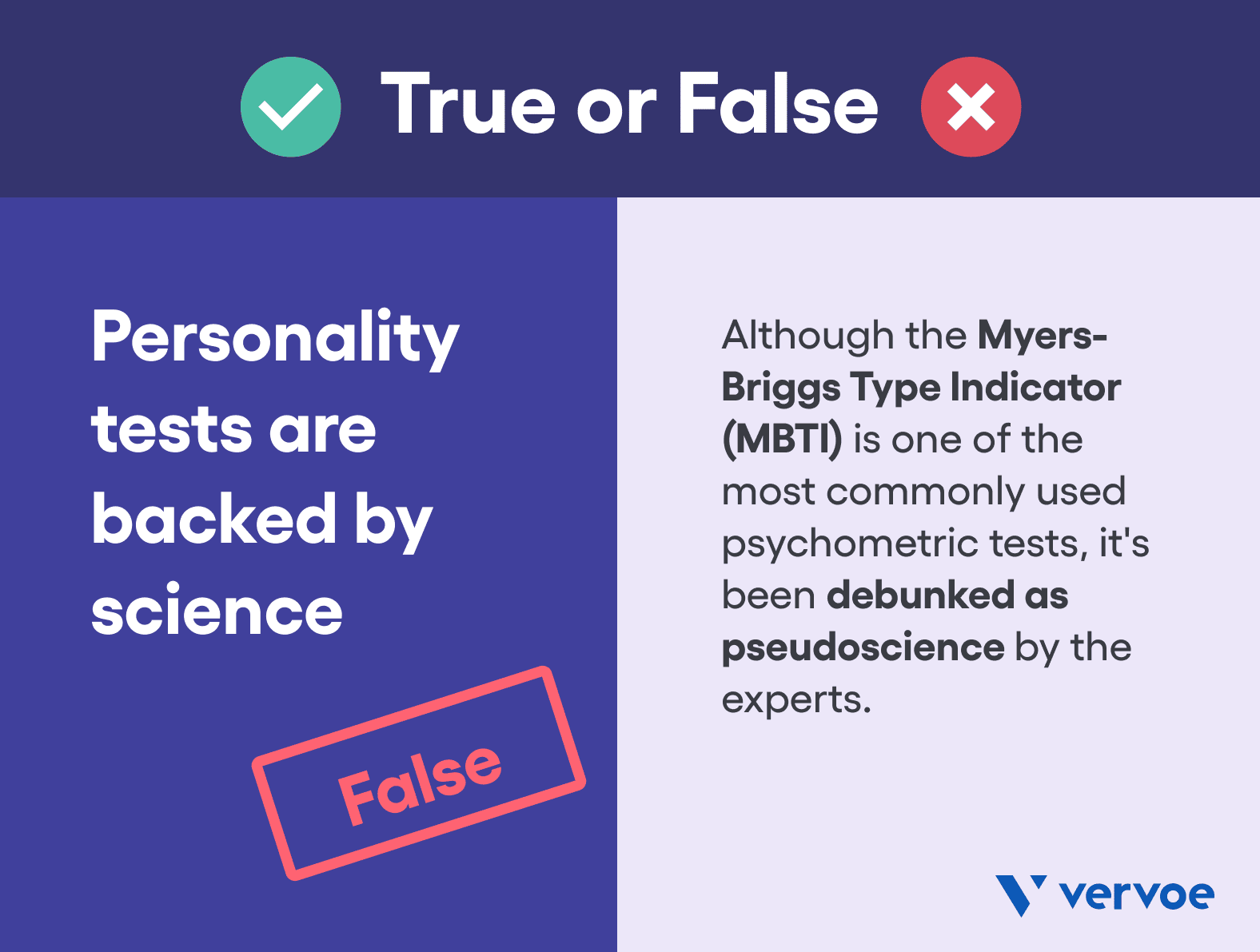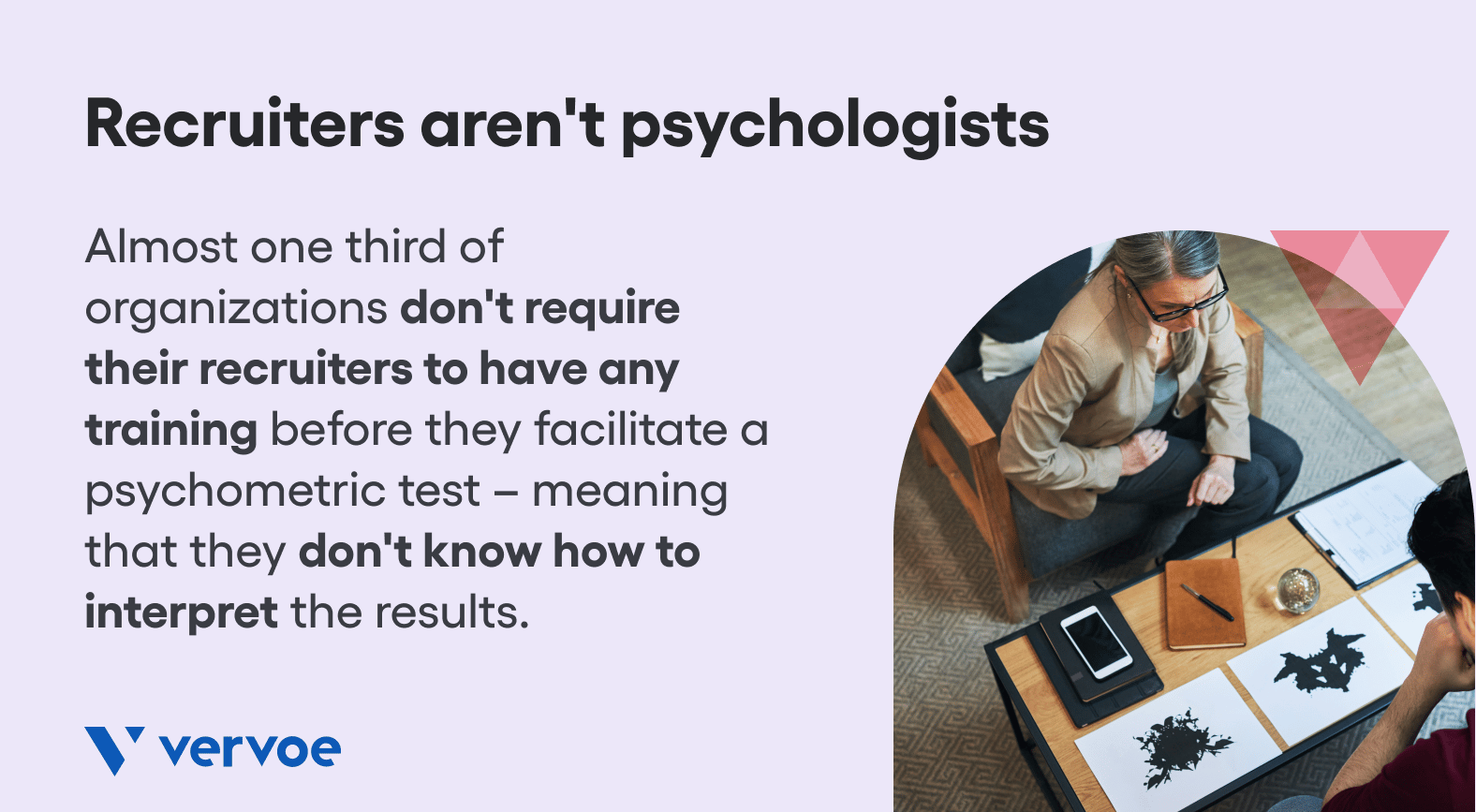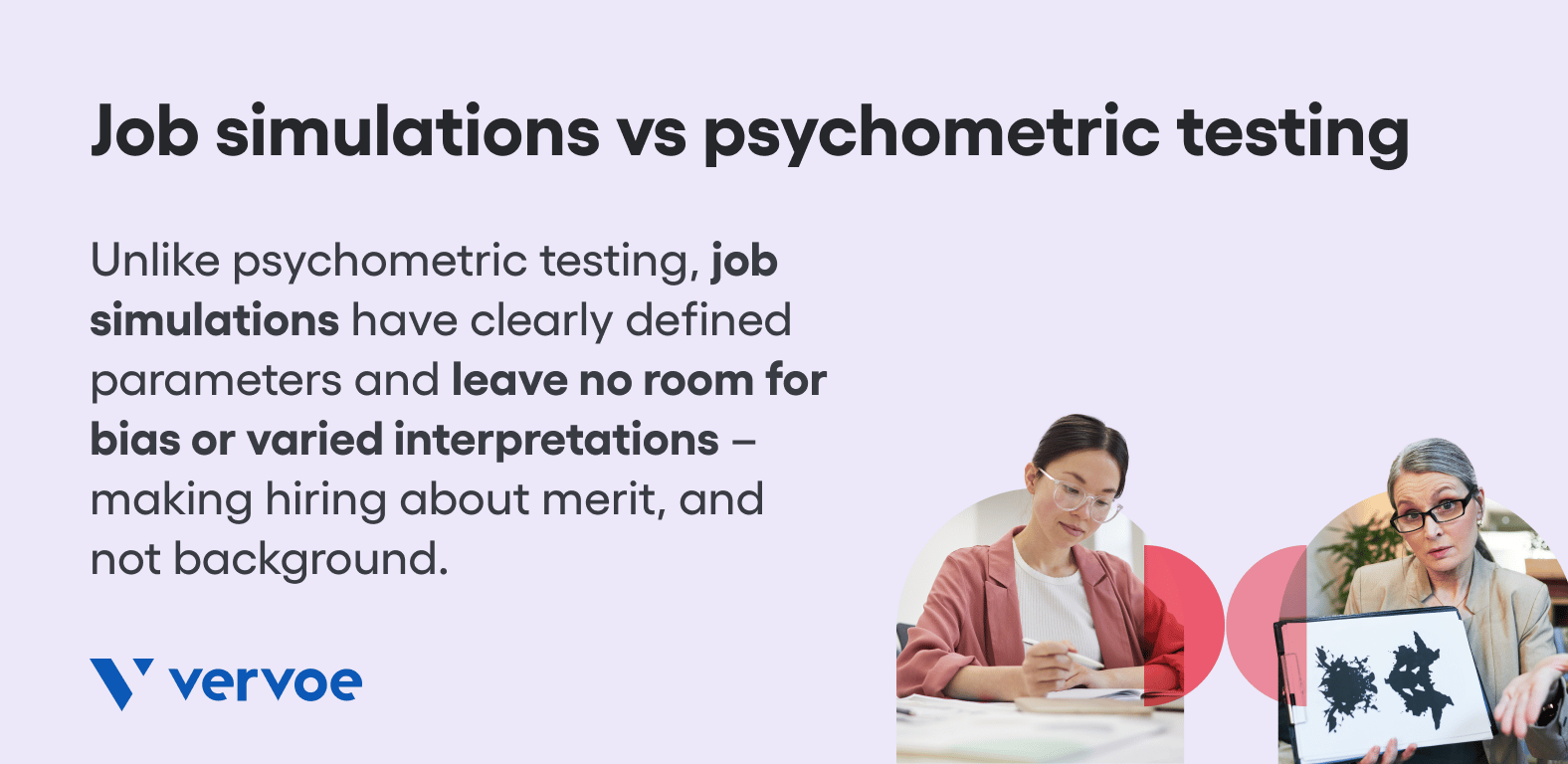While psychometric testing companies do their best to convince recruiters that cognitive assessments are a must, are job simulations the modern alternative?
In the world of recruitment, psychometric testing companies would have us believe that these types of assessments provide a rounded view of a candidate, revealing their logical processes, aptitude for problem-solving, and ability to interpret and analyze a range of data.
Some would even go so far as to say that the process also provides equally important insights into a candidate’s personality, values, and how they might fit into an existing team — but does this information really matter?
A growing number of studies would suggest that the answer is no. While psychometric testing in recruitment and selection is said to work best when it is combined with resume screening, interviews, and reference checks, the reality is that these insights don’t provide a way to view someone do the job before they get the job.
In this article, we’ll do a deep dive into why many components of psychometric testing are flawed, why the results don’t translate to world class employee performance, and how job simulations present a data driven alternative.
An introduction to psychometric testing for recruitment
Psychometric tests take many forms, and are an umbrella term for any assessment that tests one’s cognitive ability or personality. In fact, it’s highly likely that you’ve taken an online psychometric test without even realizing it, such as the highly polarizing Myers-Briggs Type Indicator (MBTI) personality test. In fact, this debunked assessment is still commonly used during the hiring process.
To understand how they work, psychometrics is the domain of science concerned with creating instruments (such as assessments) that evaluate skills, attributes, and knowledge. It is the science of assessing people’s cognitive capabilities and thought processes through a systematic procedure. Backed with a technical edge, measuring these traits is why psychometric testing companies often specialize in recruitment.
Employers typically use psychometric tests as a tool to –
- Eliminate unsuitable candidates at an early stage
- Screen candidates for interviews
- Determine someone’s ability, personality, motivation, values, and reactions to their environments
- Identify the strengths or weaknesses missing in existing teams
- Provide management with guidance on career progression for existing employees
Psychometric testing primarily falls into two main categories: aptitude tests which measure intellectual and reasoning abilities, and personality questionnaires. While gaining a deeper understanding of an individual’s thinking styles, attitude, and motivations during the recruitment process seem like a valuable component of any hiring process, the reality is that many applications of psychometric testing tied to personality quizzes have little to no scientific value.
Despite this, personality testing is an eye watering $2 billion industry with dozens of test methodologies on the market.
While the best psychometric tests for recruitment will tout their products as indispensable and backed by science, are psychometric tests reliable like the industry would have us believe?
While psychometric testing provides useful baseline data that can help hiring decisions, results can be misinterpreted or read out of context — particularly when assessed by hiring managers or recruiters who don’t have the training to interpret the data and an overreliance on personality testing.

Are psychometric tests reliable or even useful recruitment tools?
According to a study conducted by Harvard University, approximately 80% of employee turnover can be attributed to mistakes made during the hiring process. Contrary to popular belief, factors such as education, experience, and job knowledge are not the most likely predictors of successful candidates. A resume cannot articulate a candidate’s soft skills, which often reflect an applicant’s communication style and work ethic.
As such, it’s no surprise that a growing number of hiring managers are using every tool in their arsenal to streamline the process, such as deploying a psychometric test for recruitment.
While most of us would happily embrace a tool that enables us to work smarter and not harder, even the best psychometric tests for recruitment can be problematic.
In his new book, Personality Isn’t Permanent, author and organizational psychologist Benjamin Hardy argues that personality tests are about as scientific as horoscopes. These types of tests give people dangerous limiting beliefs, and there’s even research showing that people can change or even create their own personality depending on their settings or circumstances.
“Labels create tunnel vision. Personality tests are largely based on the premise that features of personality are fixed traits, and all create fixed beliefs about who you are and what you are capable of without any scientific evidence at all.”
The list of these tests is long: Myers-Briggs, DISC, the Winslow Personality Test, NEO, the Color Code, Birkman, HEXACO, the Enneagram, and many others. Despite mounting evidence proving that they aren’t generating results based on data, millions of companies still use these types of personality assessments as an integral part of their recruitment strategy.
Aside from personality quizzes, psychometric testing comes in many forms, such as an aptitude (or ability) test, a situational judgment test, a diagrammatic reasoning test, a numerical reasoning test, a critical thinking test, a verbal reasoning test, an inductive reasoning test, and even an emotional intelligence test.
The danger of these is not necessarily in the applications themselves, but in how they are interpreted.
In fact, a recent survey conducted by Personnel Today found that almost one-third of organizations don’t require individuals to have training before they facilitate a psychometric test. Would you pay someone to referee a game of football without ensuring that they have a thorough understanding of the rules? Probably not — and yet, this theory doesn’t seem to apply to psychometric testing in recruitment and selection.

What the law says about using psychometric testing for hiring
Organizations need to keep legal compliance in mind when they add an online psychometric test to their pre-employment screening system.
Anti-discrimination laws dictate what types of assessment tools — especially cognitive ability tests — can be used during the hiring process, as they need to be job-relevant and well-validated. In the United States, adhering to the Americans with Disabilities Act means that psychometric testing generally needs to respect privacy and not endeavor to “diagnose” candidates in any way.
Across the Atlantic, the European Union also has legislation in place that organizations need to consider when dabbling in psychometric testing in recruitment and selection.
Article 9 of the GDPR (General Data Protection Regulation) stipulates that medical and health data includes a person’s intellectual and emotional capacity (such as IQ). In turn, the legislation outlines a broad prohibition on processing such data, unless it falls under one of the exemptions listed in Article 9.
Meanwhile, in Australia, Professor Helen De Cieri and Professor Robin Kramar wrote in Human Resource Management that “it appears that the use of personality tests for recruitment purposes in Australian organizations is increasing, despite criticism of them as unreliable and unethical.”
The experienced human resource management academics quoted a survey of 8,000 people, in which 44% regarded personality tests as personally invasive — which they are. Yet, a survey of Australian human resource managers showed that 69% believe that personality tests are valuable tools that can be used to improve performance, despite growing concern linked to psychometric testing use in public sector employment.
Despite it becoming the norm, psychometric testing may not be entirely legal. So why are employers still flocking to psychometric testing companies in droves?
The truth is, we love to put people into buckets. The danger in looking for candidates with the personality we think might “fit”, outside of the context of a role or its capabilities, is that we end up homogenizing a talent pool to fit into a particular bucket, eliminating any shot at successful workplace diversity.
To truly validate a candidate’s skills and see how they perform on the job instead of on paper, job simulations provide a modern alternative to outdated psychometric testing practices — but how exactly do they work?
Why job simulations outdo the best psychometric tests for recruitment
Just like psychometric testing, there are many different types of job simulations available for employers to make the most of. In simple terms, a job simulation is a type of pre-employment test used for employee testing and selection that assesses candidates on their ability to perform realistic tasks and duties common to the role they’re applying for.
Although the right choice will often vary depending on the nature of the role, as a general rule, there are five primary formats that can be deployed as a part of a bias-free recruitment process:
- Role-playing simulations are designed to understand a candidate’s ability to navigate interpersonal relationships in the workplace.
- Work sample assessments aim to place candidates in a real-world situation by giving them tasks that mimic the role’s responsibilities and the types of tasks they might encounter daily.
- In-basket simulations look at how candidates approach the task, including their step-by-step process, their demeanor and approach, and how they arrive at a certain outcome.
- Situational judgment simulations are used to assess a candidate’s situational judgment and decision-making and often include multiple-choice questions.
- Take-home assignments require a candidate to complete an assessment at their own location within a specific deadline and can be particularly beneficial for remote workplaces.
The most effective type of job simulation is one that allows you to adequately assess candidates’ skills in the context of your role while giving applicants an equally valuable understanding of the job.
Instead of leaving room for interpretation or even unconscious bias, job simulations have clearly defined parameters that remove the guesswork on identifying a good hire. It comes down to seeing someone do the job, before they get the job.
With all of the benefits and none of the pitfalls of psychometric testing, it’s not surprising that job simulations are on the rise as the future of recruitment – particularly for highly skilled roles that have the potential to take down an entire company within six months if they’re the wrong hire.

Learn how we use job simulations to transform your hiring process
Vervoe is an end-to-end solution that is proudly revolutionizing the hiring process. By empowering businesses to create assessments that are tailored to suit the specific requirements of a role, Vervoe predicts performance using job simulations that showcase the talent of every candidate while eliminating potential bias.
Filling a position is a costly, time-consuming, and often stressful process when using traditional hiring practices that don’t measure, assess or validate the skills that a particular role commands. To see people do the job before they get the job, book a demo today and let our experienced team run you through Vervoe’s full range of ready-made and tailored solutions.


















